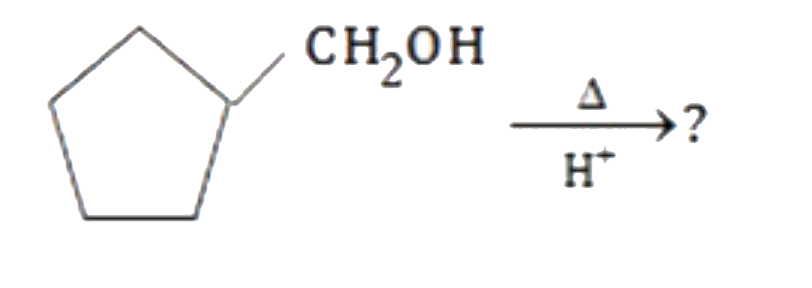Propene may be obtained by the dehydration of
ethyl alcohol
methyl alcohol
propyl alcohol
isopropyl alcohol
The correct Answer is:(C, D)
To determine which alcohols can be dehydrated to form propene, we will analyze each option provided in the question. The dehydration process involves the removal of a water molecule (H2O) from the alcohol, typically facilitated by a strong acid like concentrated sulfuric acid (H2SO4).
1. Identify the Alcohols: The options given are:
- Ethyl alcohol (C2H5OH)
- Methyl alcohol (CH3OH)
- Propyl alcohol (C3H7OH)
- Isopropyl alcohol (C3H8O)
2. Understand Dehydration: Dehydration involves the elimination of the hydroxyl group (OH) from the alpha carbon and a hydrogen atom from the beta carbon, resulting in the formation of an alkene.
3. Analyze Ethyl Alcohol (C2H5OH):
- Structure: CH3-CH2-OH
- Dehydration: Remove OH from the alpha carbon (C2) and H from the beta carbon (C1).
- Result: CH2=CH2 (Ethylene) + H2O
- Conclusion: Ethyl alcohol does not yield propene.
4. Analyze Methyl Alcohol (CH3OH):
- Structure: CH3-OH
- Dehydration: No beta carbon is present.
- Conclusion: No dehydration reaction occurs; thus, it cannot yield propene.
5. Analyze Propyl Alcohol (C3H7OH):
- Structure: CH3-CH2-CH2-OH
- Dehydration: Remove OH from the alpha carbon (C3) and H from the beta carbon (C2).
- Result: CH3-CH=CH2 (Propene) + H2O
- Conclusion: Propyl alcohol can yield propene.
6. Analyze Isopropyl Alcohol (C3H8O):
- Structure: CH3-CHOH-CH3
- Dehydration: Remove OH from the alpha carbon (C2) and H from either beta carbon (C1 or C3).
- Result: CH3-CH=CH2 (Propene) + H2O
- Conclusion: Isopropyl alcohol can also yield propene.
Final Answer:
Propene may be obtained by the dehydration of:
- Propyl alcohol (C3H7OH)
- Isopropyl alcohol (C3H8O)
- Ethyl alcohol (C2H5OH)
- Methyl alcohol (CH3OH)
- Propyl alcohol (C3H7OH)
- Isopropyl alcohol (C3H8O)
- Structure: CH3-CH2-OH
- Dehydration: Remove OH from the alpha carbon (C2) and H from the beta carbon (C1).
- Result: CH2=CH2 (Ethylene) + H2O
- Conclusion: Ethyl alcohol does not yield propene.
- Structure: CH3-OH
- Dehydration: No beta carbon is present.
- Conclusion: No dehydration reaction occurs; thus, it cannot yield propene.
- Structure: CH3-CH2-CH2-OH
- Dehydration: Remove OH from the alpha carbon (C3) and H from the beta carbon (C2).
- Result: CH3-CH=CH2 (Propene) + H2O
- Conclusion: Propyl alcohol can yield propene.
- Structure: CH3-CHOH-CH3
- Dehydration: Remove OH from the alpha carbon (C2) and H from either beta carbon (C1 or C3).
- Result: CH3-CH=CH2 (Propene) + H2O
- Conclusion: Isopropyl alcohol can also yield propene.
Propene may be obtained by the dehydration of:
- Propyl alcohol (C3H7OH)
- Isopropyl alcohol (C3H8O)
Similar Questions
Knowledge Check
An alekene X is obtained by dehydration of ann alcohol Y. X on ozonolysis gives two molecules of ethanal for every molecule of alkene. X and Y are
ACH3CH2CH2OHBCH3CH2OHCCH3CH=CHCH2OHDCH3CH2C∣OHHCH3An alekene X is obtained by dehydration of ann alcohol Y. X on ozonolysis gives two molecules of ethanal for every molecule of alkene. X and Y are
AX=3-hexene,Y=3-hexanolBX=2-butene, Y=2-butanolCX=1-butene, Y=1-butanolDX=1-hexane, Y=1-hexanol H3PO4−−−→Δ Major product obtained by dehydration of given alcohol is : A
H3PO4−−−→Δ Major product obtained by dehydration of given alcohol is : A B
B C
C D
D
Propene is not the product obtained by dehydration of :
View SolutionState one relevant observation for the following:
When the gaseous product obtained by dehydration of ethyl alcohol is passed through bromine water.
View SolutionState one appropriate observation for the following:
When the gaseous product obtained by dehydration of ethyl alcohol is passed through bromine water.
View SolutionThe ratio of the gases obtained on dehydration of HCOOH and H2C2O4 by conc.H2SO4 is
View SolutionFor the dehydration reaction.

View Solution

